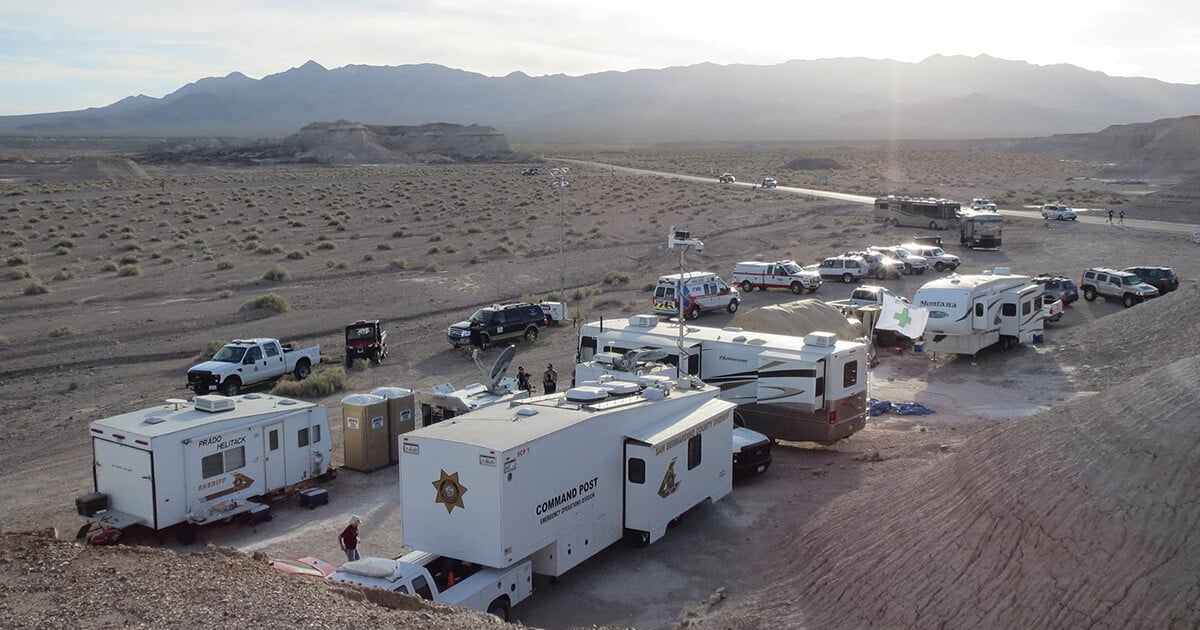Baker to Vegas: Leveraging Pulsara to Manage a Planned Event
Although they have the advantage of prior awareness and preparation, large-scale planned events pose unique challenges for emergency management...
5 min read
 Team Pulsara
:
Nov 13, 2024
Team Pulsara
:
Nov 13, 2024
![What Drives Paramedic Job Satisfaction? [2024 EMS Trend Survey]](https://www.pulsara.com/hubfs/_1_website-page-blog-assets/blog-assets/medics-talking-laughing-1200x630.jpg)
Editor's Note: In August 2024, EMS1 and Fitch & Associates released their annual EMS trend survey, What Paramedics Want, proudly sponsored by Pulsara. Because the articles and advice found within contain such critical subject matter, we've elected to publish each segment one at a time here on our blog. Read, enjoy, share, and take to heart the following information brought to you by the most prestigious thought leaders in EMS. Today's entry is written by Maria Beermann-Foat, PhD, MBA, NRP, EMS training coordinator for Eugene Springfield Fire in Oregon and former battalion chief of operations for MED-ACT Emergency Medical Services.
_____
We can agree that EMS is a critical component in the healthcare system. However, our profession continues to face significant challenges. Many of these, such as employee retention, job satisfaction and the impact of work-life balance, continue to appear year after year.
To better understand the results of the 2024 EMS Trend Survey, I was curious to see how various factors impacted how likely respondents were to recommend EMS as a career to others, e.g., respondents’ experience levels (i.e., years of service), job title, and service model. I was also curious to see how these factors correlated to comments in the next survey question, “Please let us know why you would or would not recommend EMS as a career.”
As the EMS Trend Survey collected responses from EMS professionals with a variety of experiences, from those new to the profession to veterans with more than 30 years of service, identifying common themes within stratified groups could be useful in developing agency-focused efforts for specific employee groups. As most agencies operate with tight budgets, it seems beneficial to know which 20% of solutions will provide 80% results.

Exploring the free-text response to the question, “Please let us know why you would or would not recommend EMS as a career,” the data became more interesting. Using Python script and QualCoder 3.5 software, I created two score groups: 0-4 (low scores) and 6-10 (high scores) for identifying common themes.
I identified the following overarching themes and phrases used by the group least likely to recommend EMS as a career (those who scored 0-4):
In contrast, for those most likely to recommend EMS as a career (those who scored 6-10), the five overarching themes were:
We can readily see that there are some overlaps between these groups, particularly in pay, benefits and health (e.g. stress, demanding, toll, etc.).
Areas where the low-rating versus high-rating groups seem to deviate are centered around career fulfillment, challenges being perceived as a positive, and contribution to the community as a positive. Respondents who indicated a high likelihood of recommending EMS perceive EMS as a rewarding and challenging profession. This theme resonated strongly across experience levels, but it was mainly noticed in the 21-30 years and more than 30 years of experience groups, with the 11-20 years group not far behind. These professionals emphasized the rewards of the EMS profession, drawing attention to the personal satisfaction and professional challenges that come with the job.
Career fulfillment and helping/community impact were key themes predominantly influencing those with higher recommendation scores. These emphasize the importance of career development, job satisfaction and sense of accomplishment.

Conversely, pay and benefits emerged as a critical concern, especially among those less likely to recommend EMS as a career (0-5 scores). This area was the highest-rated concern for professionals with 6-10 years and more than 30 years of experience. It indicates that while intrinsic rewards are significant, tangible benefits like salary and compensation packages are equally important. The dissatisfaction with pay and benefits suggests a need for industry-wide improvements to attract and retain talent.
Working hours and their impact on family life were significant concerns across all experience levels but were particularly pronounced for those with 0-5 years, 11-20 years and 21-30 years of experience. This issue was consistently examined as a key obstacle to the EMS recommendation which focuses on the need for better work-life balance management within our profession.
The survey results point to several areas where improvements can enhance job satisfaction and career recommendations within EMS:
The findings of this year’s EMS Trend Survey shed light on the multifaceted nature of job satisfaction and career recommendations in EMS. By addressing key concerns about pay, career advancement and work-life balance, as well as reinforcing meaningful work elements, the EMS profession can provide employees with more satisfaction and increase commitment. These changes are necessary to ensure that EMS remains a viable and attractive profession for current and future employees.
Download the full digital edition: What Paramedics Want 2024
About the Author
Maria Beermann-Foat, PhD, MBA, NRP, has over 20 years of prehospital emergency care experience in privately-owned, hospital-based and county government-based emergency services. She is EMS training coordinator for Eugene Springfield Fire in Oregon. She retired as battalion chief of operations for MED-ACT Emergency Medical Services in 2021.
Dr. Beermann-Foat holds a Ph.D. in Organization Management from Capella University and a Masters of Business Administration from MidAmerica Nazarene University.
Leveraging telehealth as a part of normal practice can actually help save time, preserve resources, and increase the output of smaller crews. Here's how.

Although they have the advantage of prior awareness and preparation, large-scale planned events pose unique challenges for emergency management...

For Those Who Love a Good "Oopsie!" At Pulsara, we pride ourselves on enabling secure, HIPAA-compliant communication for healthcare teams. But let’s...

March Recap A New Integration: Improving Data Management, Streamlining Workflows, and Improving Care CoordinationOnly a few days ago, we announced...